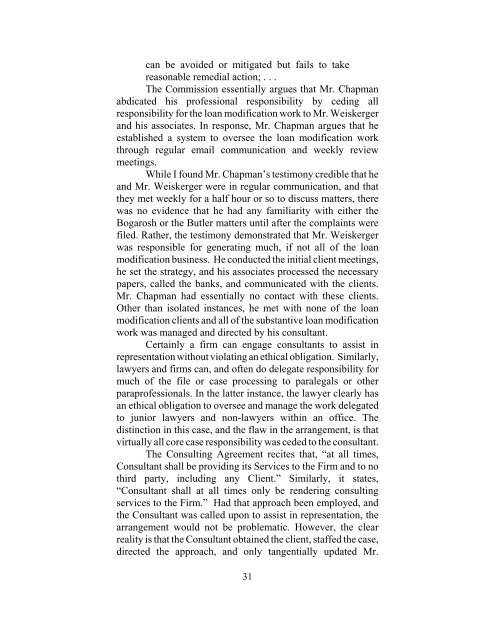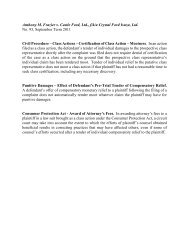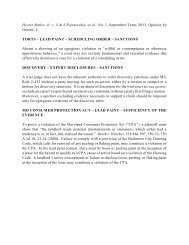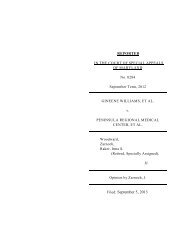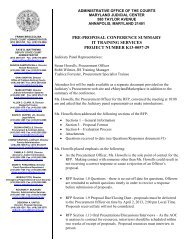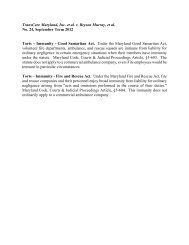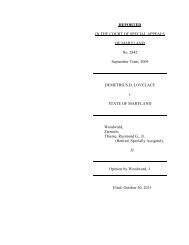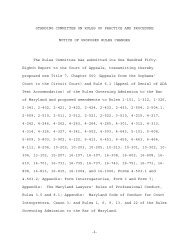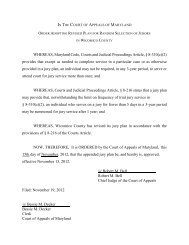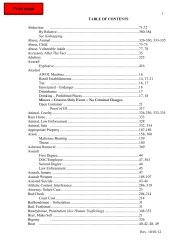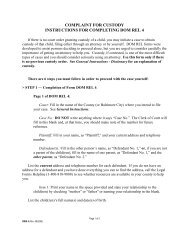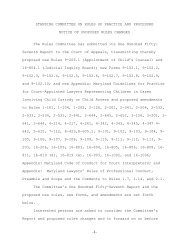44ag/11 - Maryland Courts
44ag/11 - Maryland Courts
44ag/11 - Maryland Courts
You also want an ePaper? Increase the reach of your titles
YUMPU automatically turns print PDFs into web optimized ePapers that Google loves.
can be avoided or mitigated but fails to take<br />
reasonable remedial action; . . .<br />
The Commission essentially argues that Mr. Chapman<br />
abdicated his professional responsibility by ceding all<br />
responsibility for the loan modification work to Mr. Weiskerger<br />
and his associates. In response, Mr. Chapman argues that he<br />
established a system to oversee the loan modification work<br />
through regular email communication and weekly review<br />
meetings.<br />
While I found Mr. Chapman’s testimony credible that he<br />
and Mr. Weiskerger were in regular communication, and that<br />
they met weekly for a half hour or so to discuss matters, there<br />
was no evidence that he had any familiarity with either the<br />
Bogarosh or the Butler matters until after the complaints were<br />
filed. Rather, the testimony demonstrated that Mr. Weiskerger<br />
was responsible for generating much, if not all of the loan<br />
modification business. He conducted the initial client meetings,<br />
he set the strategy, and his associates processed the necessary<br />
papers, called the banks, and communicated with the clients.<br />
Mr. Chapman had essentially no contact with these clients.<br />
Other than isolated instances, he met with none of the loan<br />
modification clients and all of the substantive loan modification<br />
work was managed and directed by his consultant.<br />
Certainly a firm can engage consultants to assist in<br />
representation without violating an ethical obligation. Similarly,<br />
lawyers and firms can, and often do delegate responsibility for<br />
much of the file or case processing to paralegals or other<br />
paraprofessionals. In the latter instance, the lawyer clearly has<br />
an ethical obligation to oversee and manage the work delegated<br />
to junior lawyers and non-lawyers within an office. The<br />
distinction in this case, and the flaw in the arrangement, is that<br />
virtually all core case responsibility was ceded to the consultant.<br />
The Consulting Agreement recites that, “at all times,<br />
Consultant shall be providing its Services to the Firm and to no<br />
third party, including any Client.” Similarly, it states,<br />
“Consultant shall at all times only be rendering consulting<br />
services to the Firm.” Had that approach been employed, and<br />
the Consultant was called upon to assist in representation, the<br />
arrangement would not be problematic. However, the clear<br />
reality is that the Consultant obtained the client, staffed the case,<br />
directed the approach, and only tangentially updated Mr.<br />
31


